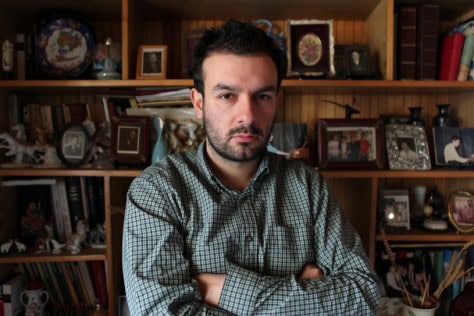With an astonishing number of recent and soon-to-be released films being shot in Berlin (including The Reader, Valkyrie, The International and Quentin Tarantino’s upcoming Inglorious Bastards) the German capital seems to be enjoying a renaissance as one of Europe’s film capitals. Indeed, the Geist mood carried over to this year’s installment of the International Berlin Film Festival, which unreeled from February 5 – 15.
In a season when the world is hurting from an epic financial crisis, the mood was more muted than last year’s rock-fest. Still, there was no shortage of glitz and glamour on display, with the likes of Kate Winslet, Demi Moore, Renée Zellweger and Michelle Pfeiffer gracing the red carpet of the Berlinale Palast. With roughly 400 films screening in the festival’s myriad program selections, however, one mostly needed to look past the star-studded fare to discover the festival’s real gems.
The main Competition program was a healthy mix of new offerings from established filmmakers and quirky―at times obscure―work from first-time and up-and-coming directors. In the former category, Lukas Moodysson’s globe-spanning Mammoth, which stars Gael-Garcia Bernal and Michelle Williams, generated the most vociferous detractors. I personally was impressed by the visual and emotional sweep of this multi-narrative, multi-lingual melodrama – a radical departure for the director: though most everyone else (so far as I can tell) found it a heavy-handed, moralizing and manipulative Babel-like mess.
French master Bertrand Tavernier returned to form with In the Electric Mist, an atmospheric Louisiana-based thriller starring Tommy Lee Jones and John Goodman that is a worthy companion piece to the director’s brilliant 1981 Coup de Torchon. (Electric Mist will be released direct to DVD in March).
Despite a fine cast that includes Willem Dafoe, Irene Jacobs and Bruno Ganz, The Dust of Time―the second chapter of Theo Angelopoulos’ latest trilogy―does not fulfill the promise of 2004’s extraordinary The Weeping Meadow. That said, there is enough elegance and enigma in this mournful meditation of the late 20th Century to make it worthwhile. That, and every perfectly composed shot bears the director’s visual signature.
Another old hand, Costa-Gavras (who was last Berlinale’s Jury President) presented his highly entertaining and politically relevant Eden is West, about an illegal immigrant of unspecified origin trying to make his way through Europe.
Alongside such cinematic luminaries was first time Peter Strickland whose astoundingly assured feature début Katalin Varga picked up a Silver Bear for outstanding artistic contribution (awarded for its atmospheric sound design). This low-budget 16mm feature was one of the festival’s biggest discoveries, not least for the extraordinary performance of the Hungarian actress Hilda Péter as a woman seeking revenge in the Carpathian Mountains.
The Milk of Sorrow, another small film from a remote corner of the world became the first Peruvian film to win the coveted Golden Bear. The second feature of director Claudia Llosa, a tightly focused study of a woman traumatized by the sexual violence visited upon her mother during the decades-long rebel uprising, was honored for achieving “a balance between the political statement and the poetic form.” With its sparse dialogue, beautiful music and mix of imagery both brutally banal and hellishly, the film is at once otherworldly and interior.
At the opposite end of the dramatic spectrum was Happy Tears, the sophomore effort of Mitchell Lichtenstein (Teeth), a dysfunctional family tragic-comedy that stars Parker Posey, Rip Torn and a remarkably unglamorous Demi Moore. They lend dignity to an oddball and oddly touching farce that has shades of Terry Gilliam, The Coen Brothers and David Lynch.
Germany was represented in Competition with Maren Ade’s Alle Anderen and the compilation film Deutschland 09, a surprisingly strong series of 13 shorts by a new crop of German auteurs, (including Tom Tykwer, Fatih Akin, Wolfgang Becker and Dani Levy) that span a wide range of issues facing present-day Germany. Alle Anderen, by contrast, is an examination of a relationship on the brink of collapse that is by turns shocking, melancholy and tender, which snagged Silver Bears for its director and lead actress Birgit Minichmayr.
Among the films that stood out in the other festival selections were two unique and totally dissimilar non-fiction films, John Greyson’s Fig Trees and Raphael Nadjari’s A History of Israeli Cinema.
A self-described “documentary opera,” Fig Trees is a Peter Greenaway-esque multi-media spectacle about two Aids activists, the Canadian Tim McCaskill and the South African Zackie Achmat. Featuring a haunting and at times irreverent score by composer David Wall, the film superimposes the story of its subjects onto Virgil Thomson and Gertrude Stein’s revolutionary collaboration “Four Saints in Three Acts” and weaves interviews with its subjects together with operatic performances and pop music video parodies.
Equally as unexpected is Nadjari’s captivating 3 ½-hour-long philosophical rumination on Israeli film from 1933 to 2005. Through interviews with filmmakers and scholars and extensive clips from films both well known and obscure, Nadjari has fashioned a wholly absorbing treatise on the dialectics of a national cinema that is a constant process of discovery.
But easily the single best film I saw at this year’s festival was the even-longer Japanese epic Love Exposure, about a petty pornographer who goes on a crusade to save his family and the girl he loves from the clutches of a fundamentalist cult. Every minute of the four-hour-long running time is a total joy that validates the mission of international film festivals such as this one: to discover bold new cinematic experiments from around the world.
 Q&A with Larry Gus
Q&A with Larry Gus We Own the Night: The Edison
We Own the Night: The Edison
No Comments